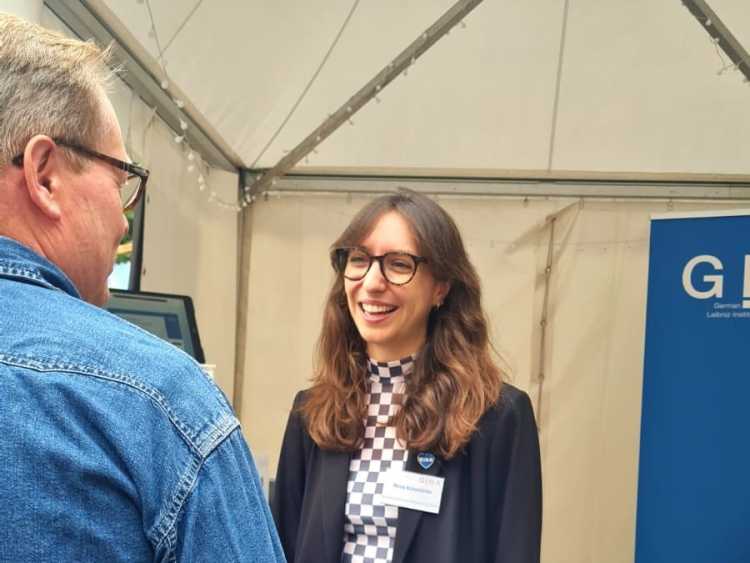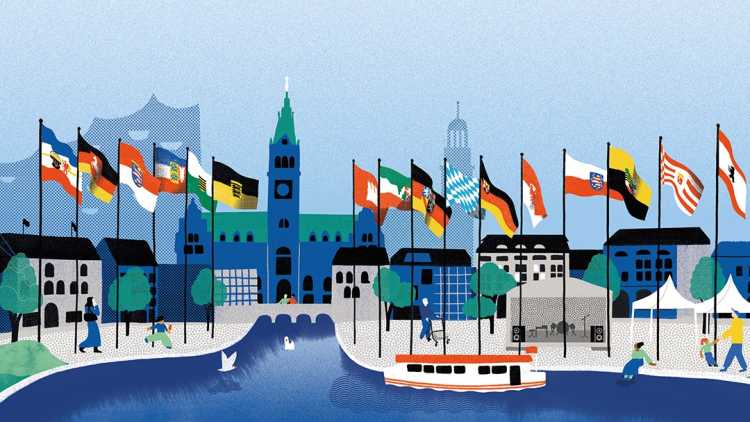Research | 30/11/2023
Citizens' Dialogue on the Day of German Unity: Your Questions, Our Answers
We had many inspiring discussions with our guests at the Citizens' Festival on the occasion of the Day of German Unity 2023 in Hamburg. We collected questions from committed citizens. Our team of scientists enthusiastically set about answering them in detail. We cordially invite you to browse through the dialogue on this page.

How many (Russian) cyberattacks have there been on European independent publishing houses since the beginning of the Russian war of aggression?
Research on sancions at the GIGAPolitically motivated cyberattacks have been a problem not only since Russia's war of aggression against Ukraine started. In March 2021, for example, the "Fancy Bear" hacker group attacked the accounts of at least seven members of the Bundestag using fake email messages (phishing emails). It was suspected that the GRU, Russia's secret service, was behind the attack. A cyberattack on Estonian websites also occurred in August 2022, when the Baltic country decided to remove Soviet monuments. In April 2022, Finland was also the victim of a cyberattack when the Ukrainian president gave a video message in parliament there.
We are not aware of any Russian cyberattacks on European publishing houses since the start of the country's war of aggression against Ukraine. The cyberattack on KaDeWe in Berlin at the beginning of November, attributed to the Russian group "Play", shows that not only public institutions but also large companies are vulnerable. Publishers could also be affected in the future. An example of this can be found in the United States, where Macmillan Publishing – one of the ten-largest publishers in the country – was the victim of a cyberattack in June 2022. With the threat of digital attacks – not just Russian ones – looming large, the European Union has created the legal framework to respond to such incidents with sanctions. The first measures of this kind, which entail travel restrictions and the freezing of assets, were imposed on two Chinese and four Russian nationals as well as three organisations in 2020.
How can I access scientific publications?
Publications of the GIGAIf the library of a particular university or research institution offers public access, you can consult the scientific publications held on-site. Many libraries have licences for various specialist journals and databases, which you can access online or in person. This includes the GIGA Information Center, which is open to all interested parties! In the respective library catalogues you can search thematically for what interests you.
Many national and international research institutions make their research results known via publications, which they make freely available on their respective websites (Open Access). The GIGA also publishes its research results, with a significant proportion of these being available Open Access. Here you can get an overview of the GIGA's publications.

How can the intellect keep instinctive fears under control, for example when it comes to migration?
Research on migration at the GIGAFears of migration are unfortunately widespread. As a general rule, this is not about fear of your own migration – you may have already moved within Germany once and can therefore be classified as an internal migrant; you may also have spent a longer period of time abroad. That is, you have previously migrated across international borders.
Instead, fear of migration usually refers to the arrival of groups that are perceived as "different," "foreign," and potentially "dangerous." It is useful to address two questions here. First, why do you consider such fears to be "instinctive," as you write? Actually, this is very illogical and not supported by facts. Only a tiny fraction of the world's population moves across international borders for any length of time; also, the vast majority of people simply do not have the resources required for migration and therefore remain in their own countries or regions. And again, only very few of these migrants move to Europe and/or Germany. What's more, migration is actually the norm in human history; sedentarisation is a comparatively new invention, and nation-states even more so. So why should we be afraid of people who change their place of residence?
Second, it is advisable to keep asking yourself which migrants you are actually afraid of and why. What do I know about these groups? What sources do I get my information from? Do I have direct contact with migrants, or do I rely on learned stereotypes and prejudices? Why am I afraid of some groups but not others? Facts can also help here, for example a look at police statistics on crime and politically motivated attacks, which show that right-wing extremist violence is a much greater danger than crimes committed by migrants. Personally, direct contact with fellow migrants also helps me a lot to understand why people come here, what hopes they bring with them, and often also how similar our desires for a "good life" are.
To what extent do people with a migrant background support the German economy? Is there a calculation of the return of investment for refugee integration assistance?
Research on migration at the GIGAFirst of all, I would ask whether humans have to have economic value. If yes, do all of them, or just some? Why?
Second of all, the German economy would not be what it is today without the millions of Italian, Turkish, Greek etc. “Gastarbeiter” (guest workers) who were invited to come to Germany in the 1950s and 60s to help build the wealth Germany is still living off today. Many industries (agricultural sectors, car production, construction, some parts of the health industry like care etc.) would collapse without workers from outside Germany – some of them seasonal, some of them permanent migrants. Also, the Syrians and Afghans who arrived in Germany in 2015/16 have helped to fend off the lack of skilled workers in a range of industrial sectors by filling the many hitherto empty apprenticeship positions. To an extent this is also true for Ukrainians who have arrived here.
Two factors play a role here: a) Germany is dying out, German society is already elderly and not enough children are being born to sustain the current population numbers, and with that the economy and social welfare systems; b) people who migrate are usually educated and relatively well-off. Migration needs resources – you need to pay for each step of the way, and you need to be able to navigate sometimes extremely dangerous migration routes. This is true for voluntary (labour) migrants as well as for people fleeing to Europe/Germany. The reason why many immigrants take a longer time to start working is that the German government doesn’t allow them to work depending on how long they have been in the country. Politics has recently finally acted on this by planning to allow people who fled to Germany to work after 6 months.

To what extent was the GIGA or other such institutes involved in drafting Germany's "China Strategy"?
The Federal Foreign Office was responsible for shaping the German government's "China Strategy." There were various working groups convened to this end, to which different organisations were invited. The German Council on Foreign Relations played a coordinating role here. The GIGA itself did not receive an invitation to any of these working groups.
Everyone knows that crude oil does not belong in the sea and that it must not be present in the food chain. So why is it still being freely prescribed in medicine?
In addition to energy generation, crude oil is also used for the production of plastics and medicines – like aspirin or ibuprofen. Unfortunately, petroleum products often end up in the sea because companies and consumers are careless or there are no legal regulations here. Regardless, petroleum cannot be easily replaced in the production of medicines. More research is definitely needed here.
Many thanks to all those who submitted their questions and to our dedicated researchers for making this initiative possible. The dialogue between citizens and academics reflects the GIGA's efforts to make its research results accessible to the wider public.
Do you have any questions about our research endeavours? Please do not hesitate to send us an email, if so: [email protected].
Your Questions, Our Expertise: Advancing Knowledge Exchange Together
SurveyWelcome to Transfer for Transformation (T4T)’s online survey! Following a successful pilot during the German Reunification Festival in Hamburg, we're excited to present "Your Questions, Our Expertise," a survey designed to advance knowledge exchange between us and you. Your perspective is crucial in shaping discussions on international affairs. We invite you to contribute your thoughts, helping us gain a deeper understanding of the diverse interests and concerns of the public in Germany, the Global South, and worldwide.
Take a moment to share your views by participating in "Your Questions, Our Expertise".
By engaging with your viewpoints, we hope to not only inform our research but also contribute to a lively public exchange of ideas. Thank you for being a vital part of "Your Questions, Our Expertise" as we advance knowledge exchange together!









